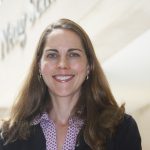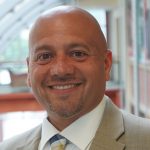The University of Connecticut has named Morgaen L. Donaldson, a renowned scholar of educational leadership and policy, as the next Philip E. Austin Endowed Chair.
Meet Jason G. Irizarry, Ed.D., who is kicking off his first full academic year as dean of UConn’s Neag School of Education. Irizarry, who grew up in New York City and served as a teacher before pursuing a path to leadership in higher education, was appointed dean for a five-year term in May 2021.
This fall, the Neag School welcomes its incoming hires, congratulates existing faculty members on new appointments, and celebrates the first full academic year with its dean, Jason G. Irizarry, and his newly appointed leadership team.
Two innovative art projects funded by the Neag School’s Rogers Educational Innovation Fund, including a photojournalism art exhibit in Norwalk, Connecticut, and a mural project at a middle school in Hartford, Connecticut, brought together middle school students this past spring. The fund is in place thanks to the support of the late Neag School of Education Professor Emeritus Vincent Rogers and his late wife, Chris, a lifelong teacher. While Professor Rogers wasn’t able to personally enjoy the fruits of the projects his fund supported due to his passing in December 2020, the projects lived on at a middle school and an art gallery.
Even before COVID-19, as many as 1 in 6 young children had a diagnosed mental, behavioral or developmental disorder. New findings suggest a doubling of rates of disorders such as anxiety and depression among children and adolescents during the pandemic. One reason is that children’s well-being is tightly connected to family and community conditions such as stress and financial worries.
This summer, the Center for Education Policy Analysis, Research, and Evaluation (CEPARE) at UConn’s Neag School of Education convened more than 50 principals, assistant principals, educators, and school district leaders from across the state of Connecticut to coach them on fostering social, emotional, and behavioral well-being and safe school environments.
Imagine a group of students not quite out of high school dedicating a considerable chunk of summer break to such activities as interpreting data, carrying out diagnostic coding, and reviewing academic literature — and loving every minute of it.
Thanks to the Young Scholars Senior Summit (YSSS), a three-week program hosted by UConn since 2018 and funded by the Jack Kent Cooke Foundation, this was the reality for select rising seniors from across the country this past July.
Lisa Sanetti is testing the efficacy of PRIME, a system designed to combat the implementation challenges behavioral interventions face in elementary classrooms.
Glenn Mitoma understands that questions of human rights require careful inquiry and extensive collaboration. His work aims to increase the realization of human rights through education and community programs.


![Illustration of hand tossing coins into a piggy bank. [Links to Alumni Board Scholarship Application]](https://education.media.uconn.edu/wp-content/uploads/sites/1621/2021/09/scholarship-graphic-featured-150x150.jpg)






